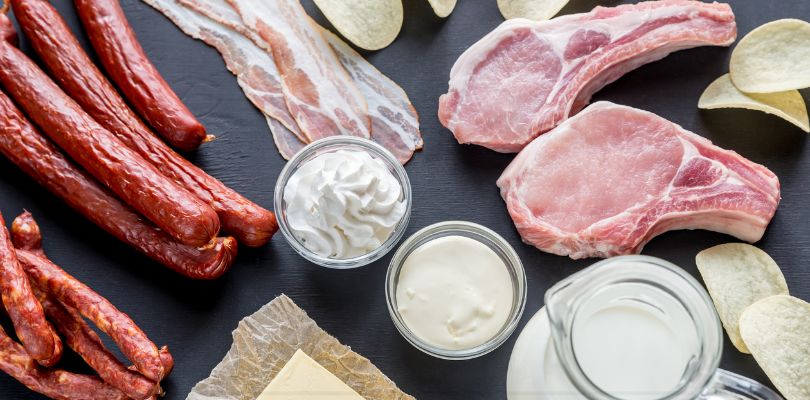Avoiding Trouble
Gastrointestinal stromal tumors (GIST) are rare cancers that occur in the digestive tract, particularly in the stomach or small intestines. Managing GIST often involves targeted therapies, including Tyrosine Kinase Inhibitors (TKIs), which help block the growth of cancer cells by targeting specific enzymes.
10 Foods to Avoid with GIST
1. Processed Meats
Processed meats like bacon, sausage, hot dogs and deli meats contain preservatives such as nitrates and high levels of salt. These can irritate the digestive system and increase inflammation, which is harmful to individuals with GIST.
This article will explore the signs of lupus, look at 10 to watch out for. Read on to learn more about these signs.
2. Fried Foods
It’s no secret that fried foods are some of the unhealthiest options to put on our plates. Fried foods are heavy in unhealthy fats, which can lead to digestive issues like indigestion and bloating. These foods can slow down digestion and exacerbate discomfort in patients with GIST, especially those already dealing with gastrointestinal symptoms from the tumor or treatment side effects.
3. Dairy Products
If you’re lactose intolerant, dairy products can make GIST symptoms significantly worse. Products like milk, cheese and ice cream can lead to gas, bloating, diarrhea and overall discomfort. Consuming these products may worsen gastrointestinal symptoms and disrupt the effectiveness of TKI treatment by aggravating the digestive tract.
4. Raw Vegetables
Vegetables are essential for overall health and are generally some of the best foods to introduce into your diet. However, raw vegetables like broccoli, cauliflower and cabbage can be difficult to digest, especially for people with gastrointestinal issues. These foods are high in fiber, which can cause gas, bloating and abdominal discomfort in GIST patients. If you are prone to gastrointestinal issues, it is recommended to steam or cook vegetables to make them easier to digest while still providing necessary nutrients.
5. Alcohol
Alcohol is not recommended for individuals with GIST, especially those undergoing TKI treatment. Alcohol can interfere with the metabolism of medications, reducing their effectiveness. It can also irritate the stomach lining and worsen symptoms such as nausea, vomiting and digestive discomfort, making it harder to manage your condition.
6. High-Fat Foods
High-fat foods like fatty cuts of meat, creamy sauces and certain baked goods can increase inflammation and strain the digestive system. They can also lead to weight gain, which may make it harder to manage GIST.
7. Spicy Foods
While spicy foods can add a fun kick to your meal, if you’re prone to GI issues, it may be best to enjoy them in moderation or avoid them altogether. Spicy foods such as hot peppers, curries and spicy sauces can aggravate the digestive system, leading to heartburn, acid reflux and stomach pain.
8. Refined Sugar
Foods high in refined sugar, such as candy, pastries and sugary drinks, can lead to inflammation and contribute to weight gain, both of which are detrimental to overall cancer management. High sugar intake has also been linked to increased fatigue and a weakening of the body’s ability to fight cancer.
9. Caffeinated Beverages
Coffee, energy drinks and other caffeinated beverages can irritate the stomach lining and lead to dehydration, which is particularly harmful to GIST patients. Dehydration can also interfere with the body's ability to tolerate TKI treatments effectively.
10. Carbonated Drinks
Sodas and carbonated water can cause bloating and gas, which can exacerbate gastrointestinal symptoms in GIST patients. Carbonation can increase discomfort and pressure in the stomach, making it difficult to eat and digest food comfortably. This can be particularly problematic for those already dealing with abdominal pain due to GIST.
GIST Treatment Options
GIST treatment options vary depending on the severity of symptoms, overall physical health and more. Some of the most commonly relied-upon treatment options include:
Surgery
In more serious cases of GIST in which symptoms are debilitating and other treatment options have proven unsuccessful, surgery is an option. In some cases, surgery may be necessary to remove a tumor, especially if it is localized and hasn't spread. The end goal of surgery is to make sure that all of the GIST is removed.
TKIs
Tyrosine Kinase Inhibitors (TKIs) are a type of targeted therapy that focuses on enzymes that promote cancer cell growth. They have been known to be highly effective in shrinking tumors and slowing their progression.
Supportive Care
Managing symptoms like nausea, pain and fatigue is essential to navigating GIST and can be used in tangent with other treatments. Some of the ways to manage symptoms include medication, physical therapy and mental health support. These steps can work to significantly improve quality of life.







